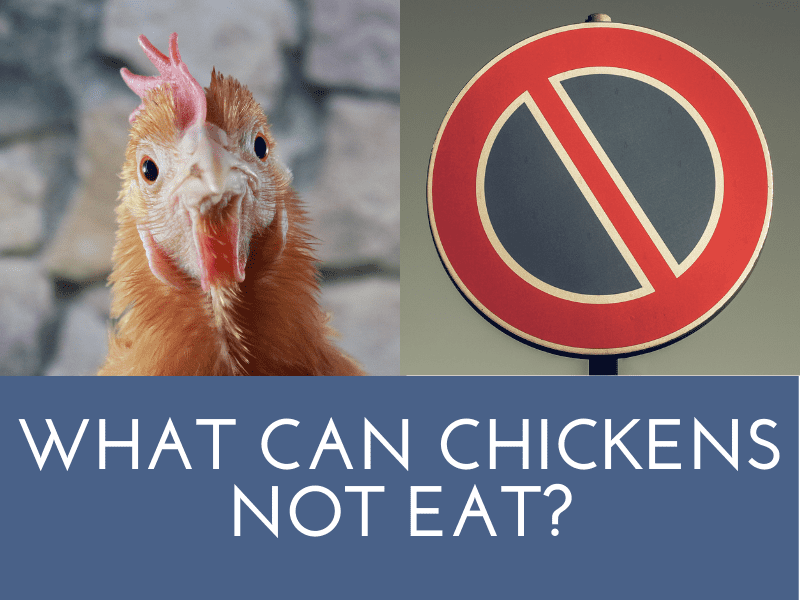There is a wise old saying that an ounce of prevention is worth a pound of cure. I can vouch that this is 100% true in my veterinary practice, particularly when it comes to feeding chickens the wrong things. Whenever a sickly chicken comes in for treatment after ingesting a toxic food, it can be challenging to turn the situation around. So what can chickens not eat? Fortunately, the list isn’t very long or too tricky to remember.
Let’s begin with A, B, C – Avocado, Beans, and Chocolate. Then add rhubarb, green potatoes, unripe tomatoes, coffee grounds, moldy food, and wet chicken feed. I also do not recommend feeding chickens a lot of salty, oily, or sugar-laden snacks.
Of course, no one intentionally gives their chickens food that could make them sick, and who wouldn’t love a few blocks of chocolate, right? It is, therefore, essential that chicken owners know what to avoid, or you may find the wrong items accidentally slipping through into the kitchen scraps bucket.
What Can Chickens Not Eat?
Did you know that our friendly chickens are the closest living relatives of Tyrannosaurus rex? Fortunately, this has equipped them with robust digestive systems, but even our little dino friends have a few culinary chinks in their armor.
The staple of any chicken’s diet should be a balanced poultry food. This should be supplemented with nutritious fruits and vegetables, and they can be given a limited amount of safe table scraps as treats.
There isn’t much that chickens won’t take an exploratory peck at. Most human food, even the daily surprise variety from the scraps bucket, is perfectly safe – provided it is only given in moderation as treats. However, there are some surprising food no-nos that can be fatal for chickens.
What Plants Are Toxic To Chickens?
Free-range chickens, with a lot of space and food options, rarely consume toxic plants. One peck of the wrong thing is usually enough for them to move on and find something more suitable.
Plenty of plants are toxic to chickens (and many other types of animals), but you would never offer ornamental houseplants or exotic plants as greens in your chicken coop!
The problem arises when chicken owners assume that, because plants are safe for humans to eat or grow in their vegetable garden, they can be safely fed to chickens.
Five of the most notorious culinary plants that must never be fed to chickens are:
- Rhubarb – The leaves from this tart-tasting pie ingredient must never be added to the chicken bucket. Rhubarb leaves are also poisonous to humans and most other animals.
- Tomato plants or green tomatoes – Chickens naturally avoid eating tomato plants if they raid your veggie patch. Ripe tomatoes are perfectly fine.
- Green, raw potatoes – We all know that when potatoes become tinged green, they are no longer safe to eat. This also applies to chickens. If your potatoes have turned green, they need to make a wide pass past the chicken coop.
Chickens love mashed potato or leftover boiled potatoes, and you can confidently add that to your chicken treats.
- Avocado peels, pits, and leaves – The mushy green part of an avo is fine for chickens, but it is best just to avoid avocado entirely, so you never have to stress about getting it wrong.
- Eggplant leaves – Free-range foraging chickens will avoid your eggplants in the veggie patch for a good reason. As a plant in the nightshade family, the leaves contain the toxin solanine. Chicken owners must be careful not to accidentally add chopped eggplant cuttings to their coop after pruning their plants.
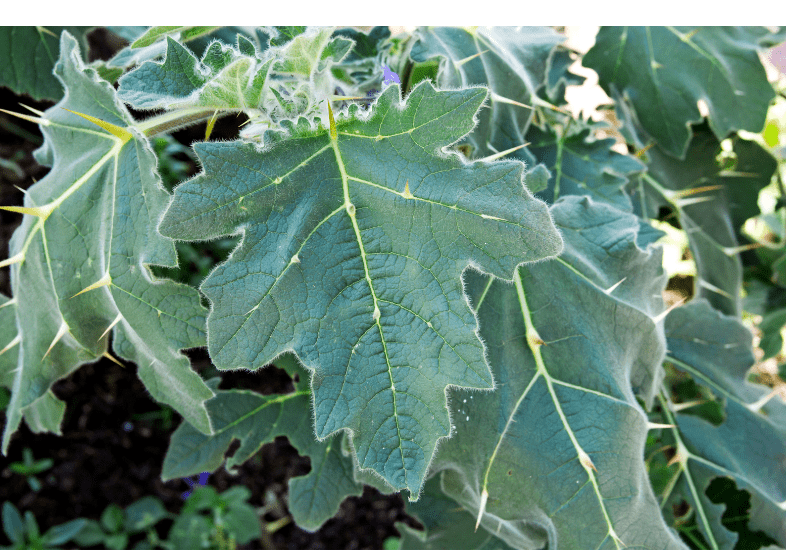
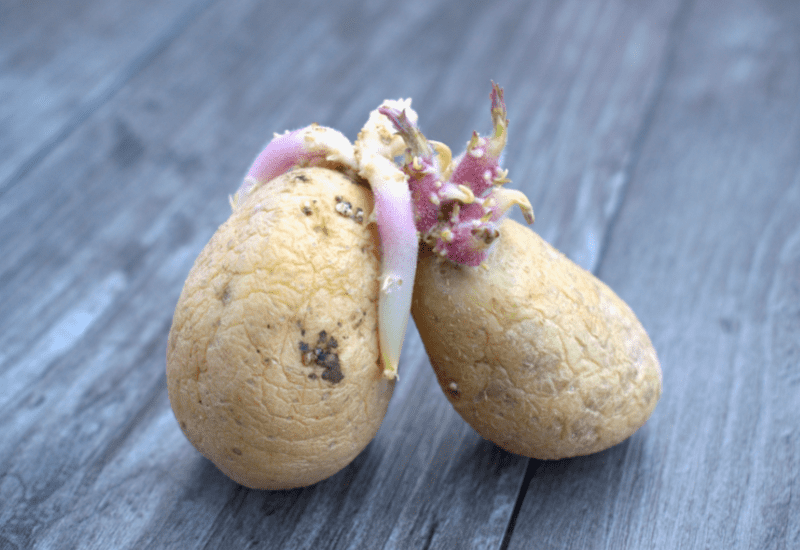
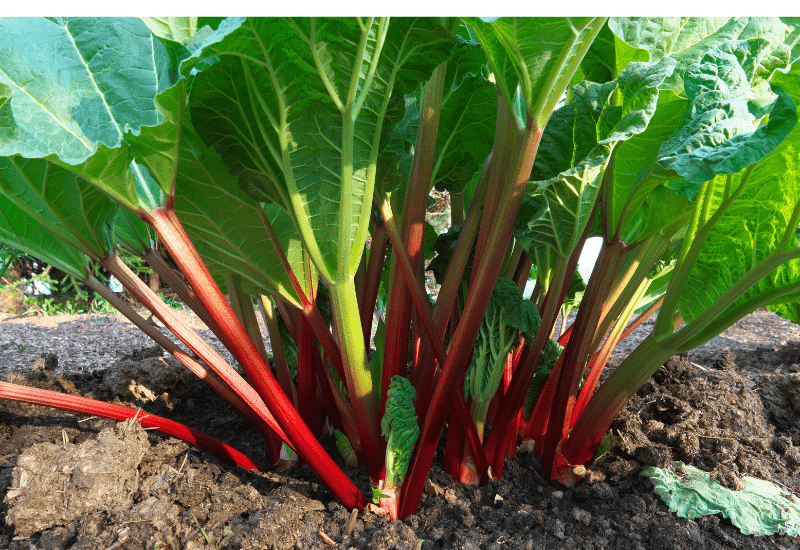
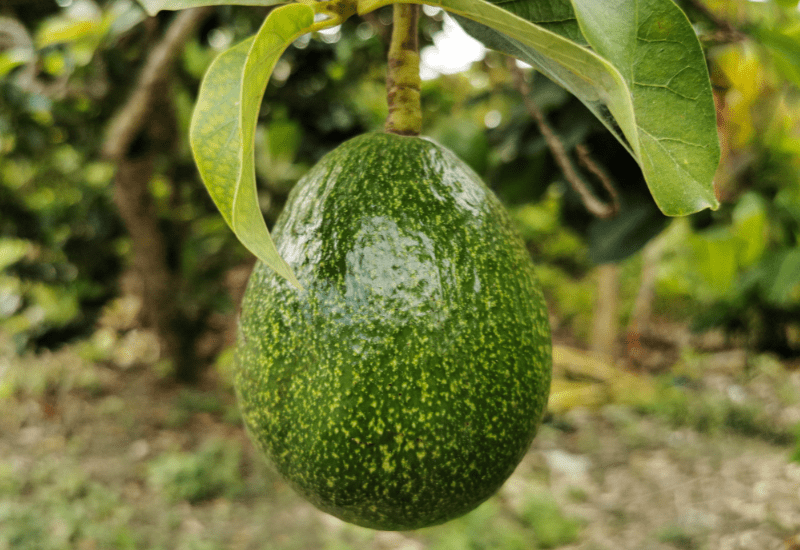
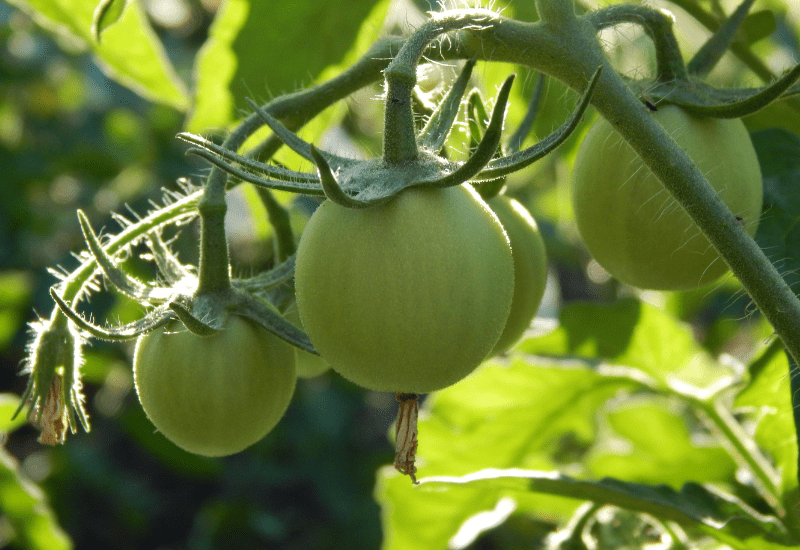
What Table Scraps Can’t You Feed To Chickens?
Table scraps are usually okay so long as they are only fed in moderation as treats in addition to a staple diet of balanced chicken food. Avoid any items that are very salty or oily – for example, butter, pickles, or salty french fries should never be highlights on the coop snack menu.
What Fruits Can’t You Feed To Chickens?
Chickens LOVE fruits, and most are very healthy as a supplement along with their staple feed. Providing watery fruit like strawberries, watermelon, or cantaloupe on hot days can even be helpful to cool your birds down.
Chickens will undoubtedly enthusiastically tuck into any delicious offerings of fruits that arrive in their coop. Remember, though, that too much of anything, especially yummy fruit such as bananas, can cause diarrhea which won’t be pleasant for the coop cleanup crew!
When it comes to fruits, the banned list is very short. There are three particular items to avoid when serving fruit to your chickens:
Green Tomatoes: Avoid green tomatoes and any green parts of a tomato plant! Ripe tomatoes are fine, and chickens love them.
While tomatoes are green, they contain tomatine, which is toxic to chickens (actually humans too, but we would need to eat a bucket load of green tomatoes to feel any effect).
Apple Seeds: If you are providing apples as part of the fruit fiesta, it’s a good idea to remove the seeds, as they contain trace amounts of cyanide. It would take a lot of apple seeds to kill either a chicken or a human, but it is always advisable to err on the side of safety!
Apricot pits: Both the pits of the fruit and the leaves of apricot trees are toxic to chickens.
Are Any Weeds Poisonous To Chickens?
There are plenty of weeds that are poisonous to chickens, but fortunately, when chickens have enough space and alternatives, they very rarely eat toxic plants. That is why I am not a big fan of feeding grass clippings to confined chickens. Besides the fact that the long grass strands can ball up and cause a blockage, any noxious weeds mowed off with the lawn will be chopped up and become unrecognizable.
Most plants that humans consider ‘weeds’ are perfectly safe and healthy for chickens. Dandelion, clover, oxalis, and chickweed may be a challenge for fastidious gardeners, but they are super healthy salad items for chickens.
All plants, even healthy weeds, become instantly toxic to chickens when a pesticide has been applied. Chickens must be excluded from areas of the yard where weeds are being treated – even lawn fertilizers can be toxic to birds.
What Else Can’t You Feed Chickens?
Let’s go through a few more items that must be totally off limits when feeding chickens:
Chocolate – If you want to give your chickens a special treat, opt for something like dried mealworms or a delicious slice of chilled watermelon, but keep all the chocolates for yourself.
Raw and dried beans – These can be fatal for chickens. Beans are only ever safe if they are thoroughly cooked.
Moldy food – Any food that is rotten or covered in a layer of mold is not safe to be consumed by any animal, including chickens.
Chicken food that has got wet – Wet chicken food is an invitation for botulism. If your chicken food bags get damp or there is any hint of moisture inside your chicken feeder, clean out everything and discard all infected feed.
Coffee grounds – Dig your coffee grounds directly into your compost pile or bin, but don’t leave it in any form that your chickens may be enticed to eat it. While most humans enjoy an occasional caffeine boost, this methylxanthine compound is toxic to chickens.
What Foods Are Not Recommended For Chickens?
Some foods aren’t toxic to chickens, but they may cause subtle changes, especially in egg quality, if you offer them regularly. Like most things, moderation is key, and small amounts are fine.
Garlic and onions – Minced garlic is a healthy addition to your chicken’s food, but there is some evidence that too much of this strongly flavored ingredient and also things like onions may taint the flavor of eggs.
Citrus – Most chickens don’t love citrus, but they will snack on it when they’ve finished off everything else they like. Citrus is safe, but there is some concern that it can interfere with calcium absorption, which is essential for egg production.
What Can Baby Chickens Not Eat?
Baby chicks can usually eat small pecks of whatever treats adult birds are eating. Mom hens often make a clucking noise to gather their chicks if they find something tasty and break tiny chick-sized bits off for their little ones.
Layer feed is one particular food that must be avoided when you have small chicks in a coop. Young chicks need starter or grower mash as their staple feed. Layer food is loaded with calcium to support laying hens, and it can create problems in the healthy growth and development of youngsters.
I prefer not to feed small chicks bread, not only because it doesn’t have much nutritional value and can cause sour crop if fed in large amounts, but also because it is a choking hazard for little ones. Chickens often snatch big chunks of food and race away, and that includes small chicks. If they gobble down a big piece of doughy bread, it can get stuck in their throat.
Unless bread has been softened by soaking in water or you have broken it into tiny pieces, be extremely careful when providing it as a treat to chicks.
If you found this information in this article useful, please share it with other poultry owners you know.
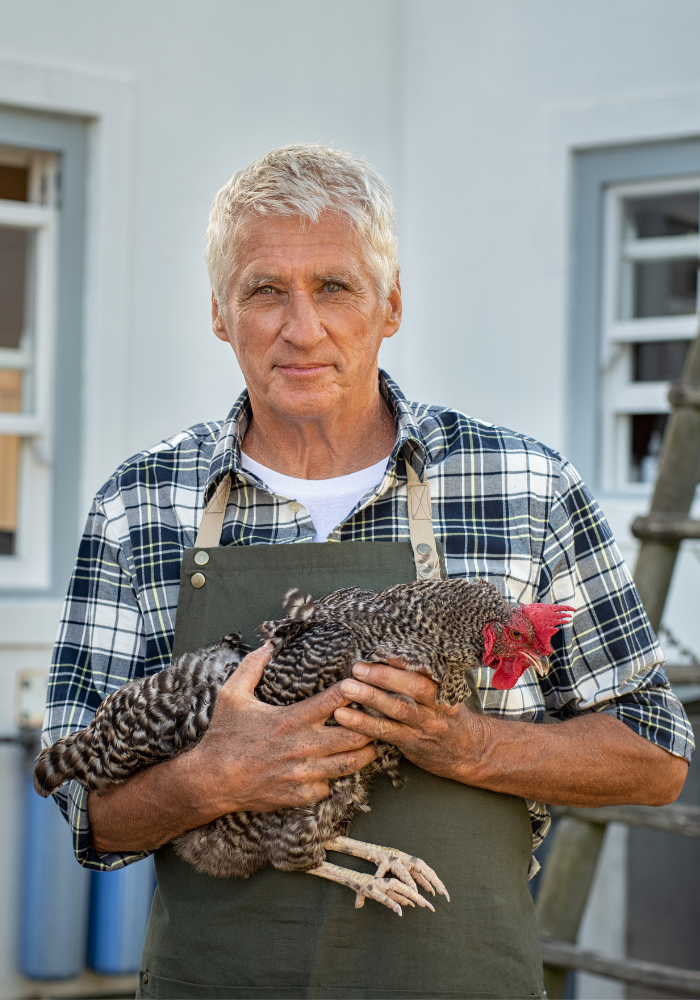
David Cameron is a passionate chicken enthusiast. Growing up, he always wanted to be a veterinarian and loved animals. After graduating from veterinary school, David spent over 40 years as an equine veterinarian. He and his wife retired a few years ago and moved to North Carolina. Here, David’s love of chickens grew even more – he now has 7 chickens and 6 quail. If you have any questions about chickens, feel free to reach out.

